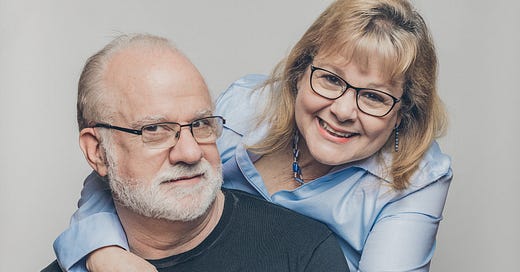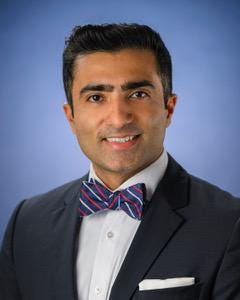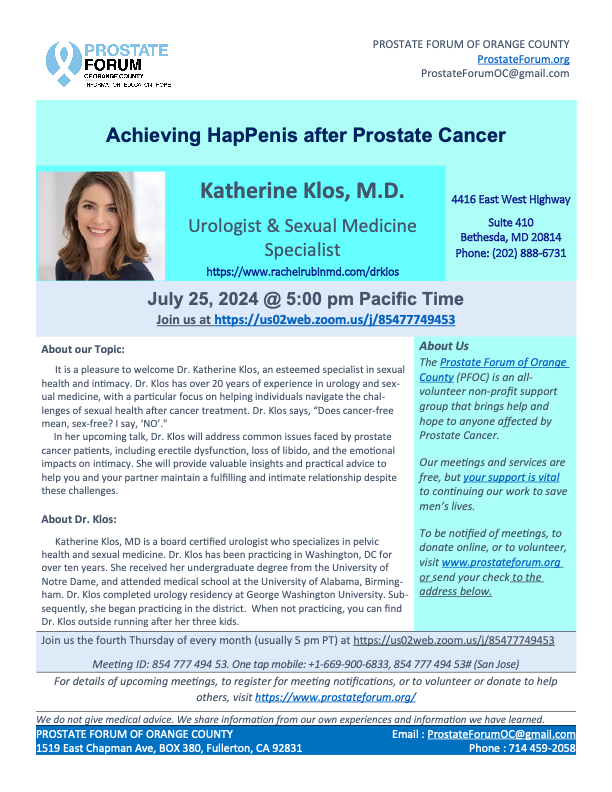Changing your luck with 2nd opinions: The Charles Brown III story
Attend the July 27 ASPI webinar "In our opinion, get a 2nd opinion."
(Editor’s note: By natue, Charles Brown III is a bit of a gambler. He’s a veteran commodities broker in the Chicago area. And for years he felt he was “rolling 12s” in the crap game of health. Then, the 12s dropped away as he began playing on the craps tabvle of 6s and 7s. But he took his chances on Second Opinions, and it dramatically has changed his lucky again. Brown will be a speaker at an ASPI (Active Surveillance Patients International) webinar at noon EST July 27 enititled, “In our opinion, get a second opinion.” Register here: https://zoom.us/meeting/register/tJUkdOqpqT0iGNHcOP4sfLoiIsdIp-nLwbUS)
By Charles Brown III
“Rolling 12s. I’m rolling 12s”
It was a phrase I often used to describe my lifelong good health. After sixty-eight years, I assumed I would always be healthy and free from major medical challenges.
I was mistaken.
In 2017, my Primary Care Physician (PCP) informed me that my PSA had risen from 3.5 to 4.5 and advised me to begin annual PSA (prostate-specific antigen) testing.
When I moved to Tennessee in 2021, my new PCP stated that my PSA level had increased to 6. Despite a smooth Digital Rectal Exam (DRE), I was told to keep annually monitoring my PSA. Upon returning to Chicago in 2023, my new PCP recommended that I see a urologist for a prostate biopsy, as my PSA had risen to the mid-6s.
I saw a urologist, who recommended I undergo a prostate biopsy. I did so in later November.
On December 7, 2023, my urologist called with my biopsy results: “You have cancer, and we need to discuss surgery or radiation treatment.” I was stunned, as my perfect health had ended.
I knew nothing about these treatment options. Still in shock, I immediately began researching and taking responsibility for my health, something I had taken for granted my entire life.
(Charles and Alice Brown)
My best friend, Keith Day, had also been recently diagnosed with prostate cancer.
So, after telling my wife, Alice, I phoned Keith. During our 90-minute conversation, we decided to educate ourselves thoroughly so that — if at all possible — we could avoid surgery, which had been recommended by both our (first) urologists.
Keith asked about my Gleason score, which I didn’t know. When I received my Gleason report, I had one 4+3 and two 3+4 tumors, with nine benign. Keith had no 4+3 tumors.
We needed to better understand what PCa risks we faced.
I can’t possible overstate how important it was to have a “buddy system” at this time in my life.
Keith and I both spent December and January learning about prostate cancer and what a complete PCa diagnosis might entail. We discovered key differences in our biopsies.
I had a transrectal 12-core biopsy, and Keith had a transperineal 10-core biopsy. We learned that TR was considerably riskier for the patient. Now, we really knew we had to full educate ourselves to ensure the most accurate diagnosis for us both.
Our extensive internet research led us to the pcri.org (Prostate Cancer Research Institute) website, where we watched Dr. Mark Scholz and Alex Scholz’s videos on a daily basis. Inspired by Dr. Scholz and his interviewer, Alex Scholz, we decided to take control of our healthcare as our own case managers. They were our champions and encouragers.
Armed with information from PCRI, I sought a second urological opinion, advocating for active surveillance instead of immediate surgery or radiation. This urologist also recommended surgery or radiation.
Despite skepticism from this second urologist, after watching key PCRI videos, I ordered a Decipher Test. The .21 result contradicted my initial Gleason score. By this time, I knew enough to thoroughly discount the advice of the second urologist.
I February, we saw a crucial video featuring Dr. Scholz and Alex honoring one Howard Wolinsky for his contributions to Active Surveillance. Howard, also from Chicago, graciously agreed to meet us.
During our 2.5-hour lunch, he recommended a second pathology read by Dr. Ming Zhou of Tufts Medical. Dr. Zhou promptly responded right there doing our lunch, and I sent my slides to him.
His mfound a significant downgrade in my cancer diagnosis: 3+3, 3+3, and 3+4 for my three tumors. Zhou's downgrade in my PCa case aligned with my “.21” Decipher Test result.
\This disparity in test results highlighted, for Keith and me, the complexity of accurately diagnosing prostate cancer and made us all the more determined to obtain the most objective diagnosis possible.
Confident we could manage our health proactively, I hired a nutritional doctor with extensive experience in prostate cancer. He recommended specific supplements and supported my vegetarian diet, high-impact training, weight loss, and lifestyle changes. I reduced my weight from 234 pounds to 187 and aimed for 174, inspired by the dietary advice of Dr. John McDougall and Dr. Stacey Loeb.
I met with a third urologist, more open to active surveillance, who recommended an MRI. Incredibly, this MRI showed no detectable cancer, a stunning and relieving result. A second PSA followed, showing a drop from 6.5 to 5.2.
In six months, I had gone from “you need surgery or radiation” from two urologists to “you have no perceptible cancer” from my MRI. ASPI webinars had also become an inspiration during this time. YES, we really can do Active Surveillance as long as we remain actively vigilant monitoring our PCa status.
Reflecting on my journey, I see my prostate cancer diagnosis as a four-pronged blessing:
Spiritual Growth: My diagnosis made me rely more on God, believing PCa to be a blessing in disguise.
Empathy: PCa has increased my empathy for those with more serious medical conditions, shifting my perspective to cherishing and preserving health.
Lifestyle Changes: PCa prompted me to overhaul my diet, exercise, weight loss, and overall lifestyle, leading to significant health improvements.
Purpose: It gave me a purpose to help other men navigate their prostate cancer diagnosis and treatment options.
Keith and I are committed to paying it forward, helping men make informed decisions about their own prostate cancer journeys, as well as encouraging them to take full control as THE Case Manager for their PCa needs. This experience, supported by resources like my wife Alice, PCRI.org, ASPI, Howard Wolinsky, my physical trainer, Tommy, my nutritionist, and ASPI, has made all the difference for me.
2nd opinions on 2nd opinions. Patient gets hat trick of opinions, radically alters his Gleason, PI-RADS, and treatment plan
By Howard Wolinsky Keith Day, a retired Chicago area commodities broker, who a year ago was diagnosed with prostate cancer, has had a hat trick of second opinions. He had second opinions for his Gleason score, his PI-RADS, and the management of his care that changed everything.
By Howard Wolinsky
Micro-ultrasound is an amazing tech that is catching on slowly and may be giving MRI a run for the diagnostic market.
Dr. Ravi Kumar, a urological oncologist on staff at Humber River Hospital in Toronto, is making a presentation on the status of micro-ultrasound, “ExactVu Micro-Ultrasound: A new frontier in urological imaging” at 7-9 PM EST Wednesday, July 24. Register here: https://conta.cc/4co75TY Prostate Cancer Support Toronto is sponsoring the meeting.
(Dr. Ravi Kumar)
Humber River Hospital is North America’s first fully digital hospital, using the latest tech to enhance all aspects of quality patient care delivery, improving efficiency, accuracy, reliability and safety.
ZERO needs your help in Congress funding CDC on PCa issues
By Howard Wolinsky
The House Appropriations Committee has made significant cuts for Fiscal Year 2025 to the Centers for Disease Control and Prevention (CDC), nearly a quarter of its funding.
Among other things, the CDC supports a number of prostate cancer activities, including outreach into high-risk communities and support for state and local prostate cancer programs, all of which are at-risk for large cuts.
I have some skin in this game. I helped win a $1 million grant from CDC—the first of its kind—to study opinions about Gleason 6 (Grade Group 1) in African AMerican and Hispanic men.
Zero said: “Your elected officials need to hear from you - these programs are critical for improving prostate cancer outcomes and saving lives.
”The Senate is next to weigh in on funding for CDC. We can help protect prostate cancer funding by telling Senators that cuts would be devastating for our community.”
Please check in here: https://p2a.co/15HnJhg
Achieving HapPenis after prostate cancer
Prostatectomies are just part of the issue. Just aging impact yor “HapPenis.”
Check out this program from out friends at the Prostate Forum of Orange County:
https://us02web.zoom.us/j/85477749453#success
Subscription update
As I am in the third week of my paid subscription campaign, I have reached about 50 new subscriptions. Also, some larger donations, up to $200, are helping me meet my goal. I have an eye on a total of 100-120 new paid subscriptions. I aim to break even, maybe do a little better. The Active Surveillor is a reader-supported publication. To receive new posts and support my work, consider becoming a free or paid subscriber.







